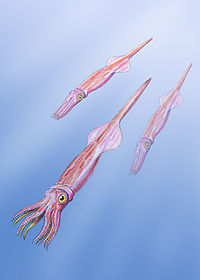Aalenian: Difference between revisions
Rescuing 1 sources and tagging 0 as dead. #IABot (v1.2.4) |
|||
| Line 305: | Line 305: | ||
==External links== |
==External links== |
||
*[http://www.stratigraphy.org/bak/geowhen/stages/Aalenian.html GeoWhen Database - Aalenian] |
*[https://web.archive.org/web/20100822030211/http://www.stratigraphy.org:80/bak/geowhen/stages/Aalenian.html GeoWhen Database - Aalenian] |
||
*[http://stratigraphy.science.purdue.edu/charts/Timeslices/6_LowerJurassic.pdf Lower Jurassic timescale], at the website of the subcommission for stratigraphic information of the ICS |
*[http://stratigraphy.science.purdue.edu/charts/Timeslices/6_LowerJurassic.pdf Lower Jurassic timescale], at the website of the subcommission for stratigraphic information of the ICS |
||
*Stratigraphic chart of [http://norges.uio.no/timescale/Fig17.1_Jur_colA.pdf the Upper] and [http://norges.uio.no/timescale/Fig17.1_Jur_colB.pdf Lower] Jurassic, at the website of Norges Network of offshore records of geology and stratigraphy |
*Stratigraphic chart of [http://norges.uio.no/timescale/Fig17.1_Jur_colA.pdf the Upper] and [http://norges.uio.no/timescale/Fig17.1_Jur_colB.pdf Lower] Jurassic, at the website of Norges Network of offshore records of geology and stratigraphy |
||
Revision as of 01:19, 2 October 2016
Template:Jurassic The Aalenian ( /ɑːˈliːniən/) is a subdivision of the Middle Jurassic epoch/series of the geologic timescale that extends from about 174.1 Ma to about 170.3 Ma (million years ago). It was preceded by the Toarcian and succeeded by the Bajocian.[1]
Stratigraphic definitions
The Aalenian takes its name from the town of Aalen, some 70 km east of Stuttgart in Germany. The town lies at the southwestern end of the Frankischer Jura. The name Aalenian was introduced in scientific literature by Swiss geologist Karl Mayer-Eymar in 1864.
The base of the Aalenian is defined as the place in the stratigraphic column where the ammonite genus Leioceras first appears. A global reference profile is located 500 meters north from the village of Fuentelsaz in the Spanish province of Guadalajara.[2] The top of the Aalenian (the base of the Bajocian) is at the first appearance of ammonite genus Hyperlioceras.
In the Tethys domain, the Aalenian contains four ammonite biozones:
- zone of Graphoceras concavum
- zone of Brasilia bradfordensis
- zone of Ludwigia murchisonae
- zone of Leioceras opalinum
Palaeontology
†Ammonitids
| †Ammonitids of the Aalenian | ||||
|---|---|---|---|---|
| Taxa | Presence | Location | Description | Images |
|
Confirmed.[3] | The only known species in this Alaskan genus. Abbasites is believed to be ancestral to the ammonite family Otoitidae. |  | |
| Confirmed.[3] | ||||
| Confirmed.[3] | ||||
| Confirmed.[3] | ||||
|
Confirmed.[3] | |||
| Confirmed.[3] | ||||
| Confirmed.[3] | ||||
| Confirmed.[3] | ||||
| Confirmed.[3] | ||||
| Confirmed.[3] | ||||
| Confirmed.[3] | ||||
| Confirmed.[3] | ||||
| Confirmed.[3] | ||||
| Confirmed.[3] | ||||
| Confirmed.[3] | ||||
| Confirmed.[3] | ||||
| Confirmed.[3] | ||||
| Confirmed.[3] | ||||
| Confirmed.[3] | ||||
| Confirmed.[3] | ||||
| Confirmed.[3] | ||||
| Confirmed.[3] | ||||
| Confirmed.[3] | ||||
| Confirmed.[3] | ||||
| Confirmed.[3] | ||||
| Confirmed.[3] | ||||
| Confirmed.[3] | ||||
| Confirmed.[3] | ||||
| Confirmed.[3] | ||||
| Confirmed.[3] | ||||
| Confirmed.[3] | ||||
| Confirmed.[3] | ||||
†Belemnites
| Belemnites of the Aalenian | ||||
|---|---|---|---|---|
| Taxa | Presence | Location | Description | Images |
| Confirmed.[3] |  | |||
| Confirmed.[3] | ||||
| Confirmed.[3] | ||||
|
Confirmed.[3] | This Eurasian species was the largest known Belemnite and could grow to lengths of up to 10 feet. | ||
| Confirmed.[3] | ||||
| Confirmed.[3] | ||||
| Confirmed.[3] | ||||
†Thalattosuchians
| Thalattosuchia of the Aalenian | ||||
|---|---|---|---|---|
| Taxa | Presence | Location | Description | Images |
| Switzerland; Morocco; England; France; Germany | ||||
References
Notes
Literature
- Gradstein, F.M.; Ogg, J.G. & Smith, A.G.; 2004: A Geologic Time Scale 2004, Cambridge University Press.
- Cresta, S.; Goy, A.; Ureta, S.; Arias, C.; Barrón, E.; Bernad, J.; Canales, M.L.; García-Joral, F.; García-Romero, E.; Gialanella, P.R.; Gómez, J.J.; González, J.A.; Herrero, C.; Martínez, G.; Osete, M.L.; Perilli, N. & Villalaín, J.J.; 2001: The Global Boundary Stratotype Section and Point (GSSP) of the Toarcian-Aalenian Boundary (Lower-Middle Jurassic), Episodes 24(3): pp 166–175.
- Mayer-Eymar, K.; 1864: Tableau synchronistique des terrains jurassiques. 1 Tabelle, Zürich. Template:Fr icon
- Sepkoski, J.; 2002: A compendium of fossil marine animal genera (entry on cephalopoda), Bulletin of American Paleontology 364, p 560.
External links
- GeoWhen Database - Aalenian
- Lower Jurassic timescale, at the website of the subcommission for stratigraphic information of the ICS
- Stratigraphic chart of the Upper and Lower Jurassic, at the website of Norges Network of offshore records of geology and stratigraphy
